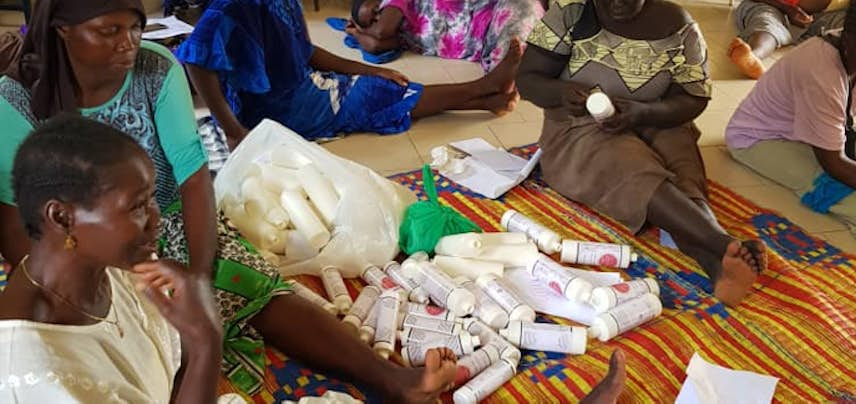Cooperation with the private sector
Since the 2015 Addis Ababa Action Agenda on Financing for Development, it has been widely recognised that it is now essential to harness the dynamism of the private sector in order to help implement the sustainable development goals (SDGs) globally. It is with this in mind that the formation of a closer relationship between the Luxembourg Development Cooperation and these actors has been encouraged, with the specific aim of identifying innovative solutions and making them available to help achieve development objectives in the Luxembourg Development Cooperation partner countries. All the avenues explored in this framework place a central focus on the responsible conduct of companies in relation to human rights and compliance with environment criteria.
On the basis of an internal review of the instruments available and ongoing projects, the year 2022 featured preparatory work for a dedicated and coherent portfolio available to LuxDev for cooperation with the private sector, in particular for mobilising companies in the Global South on economically viable projects, contributing to the SDGs and addressing structural deficiencies identified in local markets.
Thus, the teams of the Directorate for Development Cooperation and Humanitarian Affairs and LuxDev have worked together to develop a set of three instruments: (1) the Business Partnership Facility (BPF), (2) the Challenge Funds, and (3) demonstration projects. The BPF is part of the package in its revised version, while the Challenge Funds will represent a new tool available to the Luxembourg Development Cooperation. This makes it possible to launch calls for proposals on a theme dedicated to the local/regional level, to which companies in the Global South will be able to respond by proposing innovative solutions, which will subsequently be co-financed by LuxDev. The third instrument, demonstration projects, will allow these local solutions to be scaled up, if they have demonstrated adequate potential. For the latter project type, three pilot countries have been identified: Senegal, Kosovo and Rwanda. The planned financing takes the form of co-financing, its implementation will be supervised by a scientific monitoring system designed to demonstrate the outcomes of the interventions, and the award of funds will be conditional on specific commitments relating to due diligence. It should be noted that the Luxembourg national contact point for the OECD Guidelines for Multinational Enterprises is supporting LuxDev to implement an ambitious approach in terms of due diligence in the conceptualisation of these new instruments.
It should also be noted that these are three separate instruments targeting direct collaboration with enterprises. They will therefore be complementary to the various instruments available to the Inclusive and Innovative Finance Service, which seek to mobilise private financing through innovative financing tools and projects.
The Business Partnership Facility (BPF), a tool that aims to encourage the Luxembourgish and European private sector to link up with partners in developing countries (businesses, administrations or NGOs), is therefore operating according to procedures that have been revised since April 2022. The partnership approach, which lies at the heart of the instrument, promoting the North-South and South-North transfer of technologies and expertise, has been preserved. In order to better meet the private sector’s demands, the facility has gone from one call for proposals each year to a mode of operation with two selection processes per year, with one closing date at the end of April and another at the end of October, thus allowing companies to submit projects throughout the year. The eligibility areas were abandoned, and so any innovative project that can demonstrate a contribution to the SDGs in a developing country is now eligible. However, priority is still given to innovative solutions based on the smart use of emerging technologies that appear promising for implementation in often difficult contexts, preferably in the Luxembourg Development Cooperation partner countries and/or countries with projects. In addition, the website bpf.lu has been redesigned, and an online matchmaking platform has been added, thus facilitating the creation of North-South partnerships, which is an essential condition for eligibility.
In 2022, four high-quality projects were selected, taking the number of projects chosen by the BPF to 38 since 2016.
Multilaterally, the Luxembourg Development Cooperation has continued its commitment with the Enhanced Integrated Framework (EIF), a multi-donor programme directly linked to the World Trade Organization (WTO). The programme aims to provide specific support to the least developed countries to enable them to play a more active role in the global trade system. Luxembourg’s financial commitment for 2016 – 2022 amounts to EUR 4.5 million, bringing Luxembourg’s overall contribution to EUR 9 million.
The Luxembourg Development Cooperation also continued, together with the LuxDev teams, its involvement in the Donor Committee for Enterprise Development (DCED), which is a network of practitioners placed in different thematic working groups, with the aim of exchanging good practice and expertise between international actors working on the mobilisation and engagement of the private sector in development contexts.
At national level, two specific issues should be noted: the Directorate for Development Cooperation and Humanitarian Affairs has also participated actively in the work of the “Business and Human Rights” working group, responsible for implementing and monitoring the second national action plan on business and human rights (NAP 2), and in the interministerial committee responsible for defining the broad guidelines on the duty of care for Luxembourg companies, and even preparing Luxembourg’s position for negotiations in relation to a European directive in this field, scheduled for 1 February 2022.
In 2022, the Directorate for Development Cooperation and Humanitarian Affairs also took part in the Circular by Design Challenge implemented by Luxinnovation, with a specific category aimed at encouraging the Luxembourg economy to work on innovative solutions to meet the challenges faced by populations and/or practitioners in the fields of development cooperation and/or humanitarian action. The selection process runs until spring 2023 and will close with an award ceremony in May 2023.
